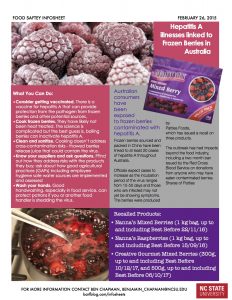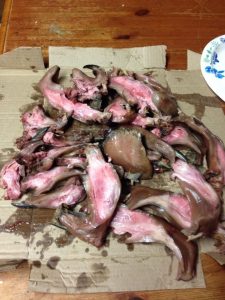Berries are a staple of my diet; I go through about 2 lbs a week of raspberries, blackberries and strawberries. When fresh berries are too expensive (or don’t look great) I substitute with frozen ones – and often cook them before eating to control for viruses.
Last year, following a hep-A-in-berries outbreak in Australia, we made a
food safety infosheet and included the following risk management steps:

•Consider getting vaccinated. There is a vaccine for hepatitis A that can provide protection from the pathogen from frozen berries and other potential sources.
•Cook frozen berries. They have likely not been heat treated. The science is complicated but the best guess is, boiling berries can inactivate hepatitis A.
•Clean and sanitize. Cooking doesn’t address cross-contamination risks – thawed berries release juice that could contain the virus.
•Know your suppliers and ask questions. Find out how they address risks with the products they buy; ask about how good agricultural practices (GAPs) including employee hygiene safe water sources are implemented and assessed
•Wash your hands. Good handwashing, especially in food service, can protect patrons if you or another food handler is shedding the virus.
Sorta the same stuff I told Sara G. Miller of
Live Science when she called to chat about the virus and berries.
Nearly 90 people in seven states have become sick in an outbreak of hepatitis A linked to frozen strawberries imported from Egypt, according to the Centers for Disease Control and Prevention. But how does the hepatitis A virus get into strawberries?
Berries of all types are actually a common conduit for viruses, said Benjamin Chapman, a food-safety specialist and an associate professor at North Carolina State University.
One of the reasons for this is that berries are very delicate, and so unlike other, hardier fruits and vegetables, berries need to be harvested by hand, Chapman told Live Science.
Because hepatitis A is spread through the “fecal-to-oral route,” if workers picking berries were infected with hepatitis A and had not properly washed their hands, they could transfer the virus from their hands to the berry, Chapman said. In parts of the world where hepatitis A is more common, this is definitely a risk, he added.
It’s more likely, however, that the water used to irrigate the strawberries was the source of the virus in this outbreak, Chapman said (I based this guess on the size of the outbreak, but who knows -ben). And, yes, because of that fecal-to-oral route, that means sewage-contaminated water.
And once a berry is contaminated, it’s unlikely that the virus will be washed off, Chapman said. Because berries are more delicate than other fruits, they’re not washed as often, he said.
The next step, freezing the berries, only further preserves the virus, Chapman said. And because frozen berries are sold as “ready to eat,” people are unlikely to heat them before eating, he said. This is especially likely if the berries are being used to make a smoothie, as occurred in the current outbreak, he added.
Chapman said that he actually microwaves all of his berries before eating them or refreezing them, though he added that his method of heating them to above 200 degrees Fahrenheit (93 degrees C) might be overkill.
Still, there’s not enough data to suggest that just rinsing the berries would sufficiently remove a virus, he said.











